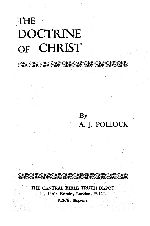Barnes Albert – Commentary
by Albert Barnes
This is an excellent Bible commentary by the Presbyterian minister Albert Barnes.
Albert Barnes (1798-1870)
Albert Barnes was a Presbyterian minister who produced a number of valuable commentaries on the Bible. He wrote Old Testament commentaries on Job, Psalms, Isaiah, and Daniel, and a complete set on the New Testament. These works have been extremely popular in both Europe and the U.S., selling into the millions of copies, though his Old Testament productions are generally considered to be superior to the New Testament works — which were written mostly for Sunday school teachers.

Pollock Doctrine of Christ 2 John 1:9-11 is a single chapter work of 28 pages looking at different aspects of the Doctrine of Christ.
PDF: Pollock Doctrine of Christ
theWord: Pollock Doctrine of Christ
MySword: Pollock Doctrine of Christ
eSword: Pollock Doctrine of Christ
Educated at Princeton seminary, Barnes was a dedicated student. He arose early in the morning and studied by lamplight — which sustained practice almost cost him his eyesight. For forty years he maintained an association with the First Presbyterian Church in Philadelphia.
Barnes had a strong sense of morality and was much opposed to the practice of slavery. In 1846, he wrote a book, An Inquiry into the Scriptural Views of Slavery.He also preached against the use of alcoholic beverages, urging total abstinence.
In 1868, Barnes was invited to deliver a series of ten lectures on “Christian Evidences” in New York. These were subsequently incorporated into a book and constitute a masterful defense of the Christian religion.
Though a Presbyterian, Barnes argued that man possesses freewill; he urged his auditors exercise their power of choice, and to respond to God’s offer of salvation. These views brought him into serious conflict with strict Calvinists. After the publication of his commentary on Romans, Barnes was charged with doctrinal heresy, and put on trial (1835) by his presbytery. Ultimately, the church’s general assembly acquitted him, though with some censure. His teaching on “unlimited atonement” (contra Calvin) helped generate a split in the Presbyterian Church in 1837. Unfortunately, the celebrated commentator was unable to divest himself of all his Calvinistic baggage.
Albert Barnes nurtured some unusual ideas. It is reported that he would not fish with a baited hook inasmuch as he considered that practice to be a form of deception (yet see Mt. 17:27).
Moreover, in his commentary on Job, when discussing the ostrich (39:13ff), he speculated that this curious creature was “the connecting link between quadrupeds and fowls.” Not even this generally conservative scholar was immune to the influence of evolutionism — though his work on Job was published a dozen years before Darwin’sThe Origin of Species came from the press. Too, under the influence of Thomas Chalmers (1780-1847), a Scottish church leader, he subscribed to the “Gap Theory,” which, he conceded, was “designed to solve some of the growing difficulties from the new science of geology.” He was intimidated by the assertions of the “scientism” of his day, hence, in weakness, compromised the biblical view of creation.
In December of 1868, at the age of 70, he delivered an address in Philadelphia titled, “Life at Threescore and Ten,” which contained his reflections on things he had learned, and had come to appreciate over the years. At the conclusion of his presentation, he cited these lines:
May some disease, not tardy to perform
Its destined office, yet with gentle stroke,
Dismiss me weary to safe retreat
Beneath the turf that I have often trod.
He hoped to die a quick death, rather than one of lingering agony. Coincidentally, two years later to the month, he died instantly while making a call of condolence at the home of a friend.
It is a sad footnote to history that Barnes has largely been ignored in the biographical sketches of influential theological writers. In the New International Dictionary of the Christian Church, he merits only a half-dozen sentences, while the infamous Karl Barth is granted an entire page. In the Oxford Dictionary of the Christian Church he is mentioned not at all.
Article taken from Christian Courier
Barnes Albert – Commentary

pc10 Sexual Purityis an exhortation to purity in sexual matters for the Christian. We look at various aspects of the issue.
Topics: It is not an impossible fight! | The Biblical Model | Homosexuality and Prostitution | Nudity and the Mind | Self-Stimulation | Resisting the Temptation.
Excerpts: Job 31:1 I made a covenant with mine eyes; why then should I think upon a maid? Job understood that sexual sin begins with the sight, and the seeing before desiring. Job made a covenant with himself, a commitment that he would not look on young women to desire them or to let his imagination run wild with them even their image or in his thoughts. Equally, Jesus taught us in Mat. 5:28 that even thinking sinful thoughts without doing them is as sinful as actually doing them. This is an amplification of Exo 20:17 “Thou shalt not covet thy neighbor’s wife”. David saw before taking (2Sam 11:2).
Fasting is to teach us that the body does not control over us, and this is exactly what is necessary for people with this problem. This sin is pinned to the thoughts, “for as he thinketh in his heart, so is he” Pro 23:7. “I can do all things through Christ which strengtheneth me” Phil 4:13.
Read the Tract: pc10 Sexual Purity.
MySwordmodules is a website dedicate to the MySword Bible Program for Androird devices. We host MySword Modules.

Buy me a piece of Mexican SweetBread!
Everybody likes sweet bread. In Mexico, it is a tradition to eat this sweetbread with coffee or hot chocolate before going to bed. But alas, while you are also enjoying the delicious stuff from my websites, I am out of money. A gift of any amount will at least let us buy a piece of sweetbread.
Please donate something for the upkeep of this website. I am bearing the burden of the monthly upkeep for years now, and I only have a few donations PER YEAR out of all of my websites, and that only like $25 dollars each time.
